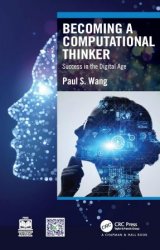Becoming a Computational Thinker: Success in the Digital Age
- Добавил: literator
- Дата: 18-12-2023, 16:22
- Комментариев: 0
 Название: Becoming a Computational Thinker: Success in the Digital Age
Название: Becoming a Computational Thinker: Success in the Digital AgeАвтор: Paul S. Wang
Издательство: CRC Press
Год: 2024
Страниц: 332
Язык: английский
Формат: pdf (true)
Размер: 46.6 MB
This book has a single purpose: to help everyone become computational thinkers. Computational thinking (CT) is thinking informed by the digital age, and a computational thinker is someone who can apply that thinking everywhere and anywhere. Through practical examples and easy-to-grasp terminology, this book is a guide to navigating the digital world and improving one’s efficiency, productivity, and success immediately.
Given its pervasiveness, knowledge and experience of computation is a cornerstone of productivity, and improved thinking will lead to advances in every aspect of one’s life. In this way, CT can be thought of as the mutual reinforcement of thinking and knowledge of computation in the digital age. Comprising a rich collection of self-contained articles that can be read separately, and illustrated by pictures, images and article-end crossword puzzles, this book is an engaging and accessible route to ‘Becoming a Computational Thinker’ and achieving ‘Success in the Digital Age’.
Computers brought us the digital revolution. People in the digital age have such wonderful things as laptops, smartphones, satellite navigation, drones, the Internet, the web, social media, streaming video, Artificial Intelligence (AI), and more. We are experiencing the fourth industrial revolution brought by significant applications of digital technologies and ever-increasing automation in all parts of our economy.
Such changes are tremendously beneficial as well as challenging. For example, we can ask Google or chatGPT any questions we may have on just about any subject and usually get answers instantly. The Internet spans the globe and brings all parts of the world within instant reach. But in the global village, rumors and fake news can spread quickly. Worse yet, hackers also could steal sensitive information or even hold our computers for ransom. As modern citizens, we want to take advantage of digital technologies while wisely mitigate the complications and risks brought by them. That’s where computational thinking (CT) can come into play.
Popular programming languages include C/C++/C#, Java, Perl, Python, jаvascript, PHP, SQL, HTML, CSS, and many more. Some of them are general-purpose; others are more specialized. Coding is an activity much like translation–take the step-by-step procedure given in English, or another natural language, and translate it into C++ or Python, for example. Once in the form of computer code, a program can be run on the target computer system for testing, debugging, revision, and updating. When ready, the program can be released for general use, until the next version takes its place.
To become a computational thinker, we need just two things: (1) To have a good understanding of computing and digital technologies and (2) to be inspired and apply that knowledge to solve problems and improve the way we do things in all areas and in our daily lives. As we stated in the introduction of this book, CTers problemize, and that is exactly the kind of problem-solving we are discussing here. At the center of computing is the idea of automation. Computers are universal machines that can be programmed to perform almost any task. They allow us to automate solutions to problems. Such solutions can be performed by computers repeatedly, reliably, precisely, and with great speed. Not all problems lend themselves to automated solutions, but computational thinkers prefer solutions that can be automated. The stages of computer automation are conceptualization, algorithm design, program design, and program implementation.
Aimed at the general reader, this book provides insights that can be applied across the full spectrum of industries and practices, helping readers to not only adapt and function in the digital world but also take advantage of new technologies and even innovate new ways doing things.
Скачать Becoming a Computational Thinker: Success in the Digital Age
Внимание
Уважаемый посетитель, Вы зашли на сайт как незарегистрированный пользователь.
Мы рекомендуем Вам зарегистрироваться либо войти на сайт под своим именем.
Уважаемый посетитель, Вы зашли на сайт как незарегистрированный пользователь.
Мы рекомендуем Вам зарегистрироваться либо войти на сайт под своим именем.
Информация
Посетители, находящиеся в группе Гости, не могут оставлять комментарии к данной публикации.
Посетители, находящиеся в группе Гости, не могут оставлять комментарии к данной публикации.
